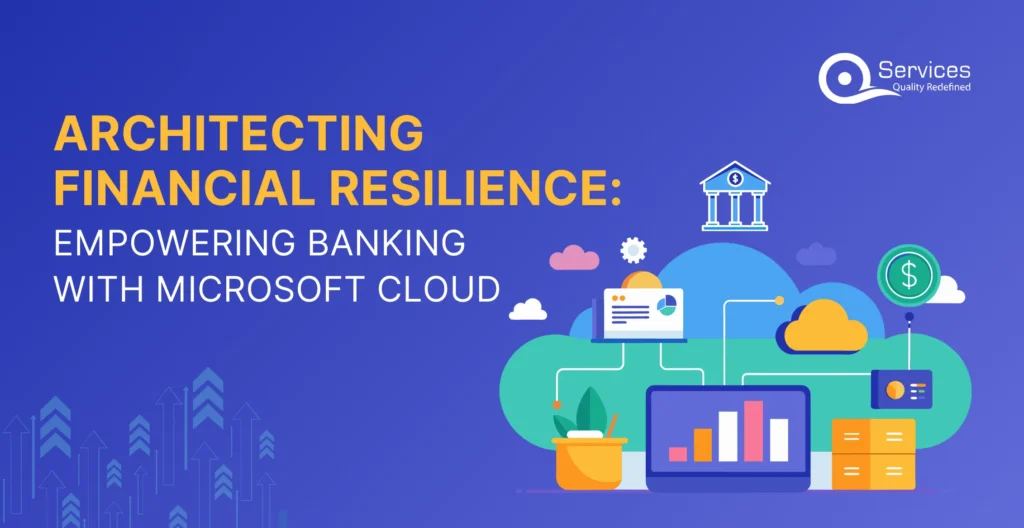
Home » Architecting Financial Resilience: Empowering Banking with Microsoft Cloud

Financial services industry is at a major turning point, driven by rapid digital innovation. Banks and financial institutions are increasingly adopting cloud solutions, not just to save costs, but also as a key component of new service delivery models. In addition, the cloud’s agility, scalability, and security help banks meet the evolving needs of customers and regulators.
In this blog, we’ll explore how Microsoft Cloud for Financial Services (MCFS)serves as a versatile tool for building financial resilience. Specifically, our aim is to demonstrate how banks can utilize MCFS to enhance their operations, streamline compliance, and foster innovation that aligns with customer expectations in the digital age. According to a recent report, 77% of financial institutions attribute increased innovation to cloud adoption. This statistic underscores the pivotal role of cloud services in the industry’s ongoing evolution.
We’ll talk about significant topics, including:
This blog seeks to engage readers by showcasing the practical benefits and innovative opportunities that MCFS provides to the financial sector.
Microsoft Cloud for Financial Services (MCFS) is tailored to meet the distinctive needs of the financial services industry, blending Microsoft’s robust cloud capabilities with specialized features essential for digital transformation such as:
MCFS provides industry-specific capabilities to manage financial data at scale and deliver differentiated experiences.
It includes a common data model and reusable components that accelerate time to market and enhance solution interoperability.
It leverages AI and automation to streamline processes, personalize customer interactions, and provide rich data insights.
In addition, Azure ML supports Python and R for creating models, providing options for both automated machine learning (AutoML) and custom coding. This versatility allows users to leverage various algorithms and frameworks to develop sophisticated machine learning models efficiently.
Get free Consultation and let us know your project idea to turn into an amazing digital product.
Customer Acquisition and Engagement: It enhances customer engagement through data consolidation, personalized actions, along with remote sales and service capabilities.
Onboarding, Servicing, and Support: The platform simplifies onboarding, automates processes, and facilitates omnichannel communications.
Risk Management: Includes tools for financial crime protection and risk analytics to manage financial data securely.
Enterprise Operations Improvement: Supports agile, data-driven operations and employs hybrid and multi-cloud strategies to meet modern banking needs.
Adopting Microsoft Cloud brings numerous advantages that are transforming the financial industry:
Provides advanced security features such as threat detection, analyzing 6.5 trillion signals daily for potential threats, and data encryption that secures data both at rest and in transit. For banks, this translates to robust protection of customer data, with 99.9% of cyber threats detected and blocked, ensuring compliance with global regulatory standards like GDPR.
Financial institutions leverage Microsoft Cloud’s scalable infrastructure to handle up to 50% more transactions during peak periods without additional physical infrastructure. This capability ensures smooth operations and customer transactions, maintaining service levels efficiently.
By adopting cloud technology, banks can reduce IT expenses by up to 40%, eliminating the need for extensive physical infrastructure and leading to lower costs in hardware maintenance and energy consumption. These savings allow banks to reallocate resources to enhance service delivery and innovation.
Cloud analytics and AI allow banks to achieve a 25% increase in customer satisfaction by offering personalized financial services. This personalized approach contributes to a 30% increase in customer loyalty, driving long-term relationships and trust.
Its disaster recovery and business continuity features ensure 99.99% uptime, enabling banks to maintain uninterrupted services even during natural disasters or cyber incidents. This reliability safeguards customer trust and reinforces the bank’s reputation for operational excellence.
Financial institutions leveraging Microsoft Cloud accelerate product deployment by 50%, enabling them to launch new mobile banking apps and financial services faster than competitors. This agility in responding to market demands strengthens competitiveness and positions banks as leaders in digital innovation.
In today’s competitive banking world, engaging customers goes beyond just transactions—it’s about building strong connections that keep them coming back. Engaged customers not only stick around longer but also tend to buy more. Banks that nail customer engagement can see up to a 22% increase in cross-selling and boost new sales by around 15%.
MCFS changes the game by using AI and data analytics through Azure Synapse Analytics. Imagine a bank that analyzes your spending habits in real-time to offer personalized money tips and suggest products that fit your financial goals. This kind of tailored advice and proactive service can bump up customer satisfaction scores by as much as 35%.
Offers essential tools to enhance how banks interact with customers:
Data Protection and Privacy: Cloud employs advanced encryption methods to protect financial data both at rest and in transit, ensuring robust security. It strictly adheres to global privacy standards, empowering customers with control over their personal information.
Regulatory Compliance: The platform meets essential financial industry standards, ensuring compliance with key regulations and guidelines.
Certifications and Audits: Holds industry-leading certifications and undergoes regular audits to maintain high standards of security and compliance.
Risk Management: Tools like Microsoft Purview Compliance Manager enable organizations to assess and manage compliance risks effectively, enhancing overall security posture.
Continuous Monitoring and Assurance: Provides continuous risk analysis and oversight across hybrid cloud environments, enhancing threat detection capabilities and simplifying compliance management for financial institutions.
Microsoft Azure cloud services play a crucial role in the integration and modernization of banking systems, offering a suite of services that enable financial institutions to transition from legacy systems to agile and scalable cloud-based solutions. Here’s a detailed look at how Azure facilitates this transformation:
Role of Microsoft Azure: It provides a robust platform for banks to modernize their IT infrastructure, enabling them to leverage the cloud’s scalability, reliability, and security. By adopting Azure, banks can:
It also offers a range of cloud development services that support the development and deployment of cloud applications:
Simplifying the deployment, management, and scaling of containerized applications, AKS provides a reliable environment for critical banking applications. It ensures high availability, supporting banks in delivering uninterrupted services to customers.
As a part of Microsoft’s suite of tools for continuous integration and delivery (CI/CD), enables banks to streamline their software development lifecycle. This includes optimizing for Microsoft banking software, helping teams adapt quickly to market changes, and improving time-to-market for new banking solutions.
Facilitating cloud application development services, Azure App Service allows banks to build and host web apps, mobile back ends, and RESTful APIs in their preferred programming language without managing infrastructure. This flexibility supports agile development practices, facilitating the creation of customer-centric banking applications.
Azure database services and migration solutions ensure secure and seamless transfer of financial data to the cloud:
Azure SQL Database: As a fully managed relational database within Microsoft Azure cloud managed services, with built-in intelligence, supports modernizing existing SQL workloads in banking operations. It ensures data security and performance optimization critical for handling financial transactions securely.
Facilitating seamless migration of multiple database sources to Azure data platforms, Azure database Migration Service minimizes downtime while maintaining data integrity. It enables banks to leverage cloud scalability and reliability without compromising operational continuity.
Financial institutions can achieve considerable improvements in customer service by streamlining their processes and updating their banking systems with Microsoft Azure. With its extensive selection of services enables them to maintain their relevance and competitiveness in the modern digital landscape.

The financial services industry is seeing big changes in how they use cloud technology, driven by digital transformation, better customer experiences, and smarter data analytics. Here are the key trends:
This tech is changing how customers interact with financial services and manage their money, making financial planning more personalized and helping insurers assess risks more accurately.
Banks and finance firms are adopting hybrid cloud setups more and more. This lets them handle their workloads better while meeting rules about personal data and privacy, which are always changing.
Cloud Value Growth: Even though it’s early days, more financial institutions are shifting their IT stuff to the cloud. Right now, only about 13% have moved half or more of their IT operations there, but that number’s expected to go way up in the next few years.
Regulatory Changes: As AI and cloud tech get bigger, there’s more focus on making sure laws keep up. This is all about protecting people’s personal data and privacy as these technologies grow.
Cloud as a Game-Changer: Cloud computing isn’t just a tool anymore—it’s a way for banks to completely change how they do business. It lets them come up with new services faster, get better info about their customers, and save money on how they run things.
Microsoft Cloud for Financial Services (MCFS) is a game-changer for the financial industry, tackling key challenges like scalability, resilience, and compliance in today’s fast-paced digital world. For finance leaders, being able to scale operations smoothly and stay resilient during disruptions is crucial.
With AI and advanced analytics integrated into MCFS, banks can offer personalized customer experiences and drive innovation, staying competitive in a customer-focused market. Embracing cloud technology allows financial institutions to continually enhance service delivery, customer satisfaction, and overall business performance.
For further insights into how Azure Development is reshaping the financial landscape, we invite you to explore our detailed analysis in our blog on ‘Why Businesses Are Moving Their Data to the Azure Cloud‘, which delves deeper into how Azure Development supports these initiatives.

Our Articles are a precise collection of research and work done throughout our projects as well as our expert Foresight for the upcoming Changes in the IT Industry. We are a premier software and mobile application development firm, catering specifically to small and medium-sized businesses (SMBs). As a Microsoft Certified company, we offer a suite of services encompassing Software and Mobile Application Development, Microsoft Azure, Dynamics 365 CRM, and Microsoft PowerAutomate. Our team, comprising 90 skilled professionals, is dedicated to driving digital and app innovation, ensuring our clients receive top-tier, tailor-made solutions that align with their unique business needs.

In this blog, we’ll explore how AI-driven automation is reshaping banking. From boosting operational efficiency to improving compliance and risk management, we’ll look at how this technology is creating smarter, more adaptive financial systems.

Traditional fraud detection methods often fall short in detecting today’s fraud intelligence. They rely on pre-set rules and struggle a lot. This is where the role of machine learning steps in. Using AI-powered fraud detection in banking is a smart way to deal with cyber threats.

The combination of Microsoft AI, Azure Health Insights, and Azure Cognitive Services is transforming healthcare by allowing smarter and efficient decision-making based on data. These technologies can fundamentally change the conventional practices of healthcare by taking new approaches to enhance
Cloud computing revolutionizes banking with scalable and flexible solutions that boost operational efficiency and enhance customer experiences. Banks utilize the cloud for Customer Relationship Management (CRM), effectively managing and analyzing customer data to personalize services. Cloud technology plays a crucial role in fraud detection, leveraging big data analytics to detect and prevent fraudulent activities.
A hybrid or multi-cloud strategy that combines the control of private clouds with the agility of public clouds is frequently the best cloud solution for banking. This approach helps banks streamline operations, adhere to rules, and provide secure services. Among top providers like AWS and Google Cloud, Microsoft Azure stands out for providing specialist financial services solutions made to fit the requirements of the banking sector.
Switching to cloud banking offers numerous benefits, including enhanced operational efficiency, cost reduction, and improved data security. It enables banks to provide innovative services with greater scalability and flexibility, while also ensuring compliance with regulations. Cloud banking supports disaster recovery and risk management and allows for a pay-as-you-go model that aligns with the bank’s needs.
Empowering Employees: The platform enables efficient management of financial services data, streamlining processes through automation.
Risk Management and Compliance: It helps meet compliance requirements, strengthens security and privacy, and fosters resilience and transparency.
Modernizing Core Banking: Financial institutions can modernize their core banking systems by leveraging Microsoft Cloud for Financial Services.
By moving to cloud platforms like Microsoft Azure, financial institutes can:
Mitigate Issues: Modernization and digital transformation help address challenges such as fraud, regulatory scrutiny, and the need for rapid digital adoption.
Provide Value to Customers: Cloud solutions enhance customer experiences and streamline business processes.
Access and Analyze Data Rapidly: Cloud computing expedites time to market and scalability of innovative products.
INDIA : F-190, Phase 8B, Industrial Area, Sector 74,
Mohali, India
CANADA : 55 Village Center Place, Suite 307 Bldg 4287, Mississauga ON L4Z 1V9, Canada
USA :2598 E Sunrise Blvd, Fort Lauderdale,FL 33304,
United States

Founder and CEO

Chief Sales Officer
